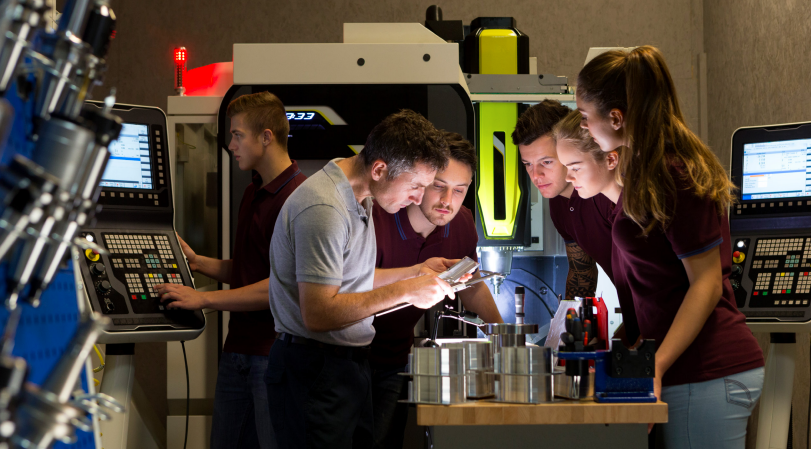NEWS & EVENTS
Education and Workforce Experts Provide Recommendations for Aligning College Curricula and Other Workforce Strategies with Advanced Manufacturing Needs

Team of College & University Faculty Recommends Paths to Address Lightweighting Technology Competencies in Curricula and Workforce Strategies
Contact:
Joe Steele
LIFT
(313) 309-9132
jsteele@lift.technology
Contact:
Jeff Lieberson
APLU
(202) 478-6073
jlieberson@aplu.org
Contact:
Pam Hurt
(248) 867-3525
pamh@ncms.org
DETROIT – A new report from leading national higher education and workforce experts says colleges and universities should work with industry to modify their curricula to ensure students gain the knowledge, skills, and abilities they will need upon graduation for jobs that involve new lightweighting technologies, materials, and processes.
The report, the first in a series of six scheduled releases, was created by a team of college and university faculty (Expert Educator Team, or EET)—experts in both materials science and education and workforce preparation—assembled by LIFT – Lightweight Innovations for Tomorrow, the Association of Public and Land-grant Universities (APLU), and National Center for Manufacturing Sciences (NCMS).
The report includes recommendations about college-level competencies required for emerging technologies and lightweight metal solutions across several industries. The report urges programs at both the technical/production (two-year, associate’s degree) and design/engineering (four-year, bachelor’s degree) levels to review curricula and integrate materials and approaches that address compentencies in four different manufacturing areas, including integrated computational materials engineering (ICME), metamorphic manufacturing, distortion control, and thin-wall aluminum die casting.
As part of those recommendations, the EET also suggests how the LIFT Learning Lab at the organization’s headquarters in Detroit can better support students through internships, teacher training, and on-site instruction. This includes both bringing students to LIFT for work-and-learn opportunities and creating virtual learning experiences for those who are unable to attend sessions in person. Virtual experiences would also help to scale the trainings to a large number of programs.
“These recommendations represent an important step in closing skills gaps in emerging technology areas,” said Jim Woodell, vice president for economic development and community engagement at APLU. “There is tremendous research going on around the country and it is important that we bring the conversation about education and workforce needs closer to the development of emerging technologies. If we wait until technologies are deployed, it’s too late.”
“The recommendations do an excellent job of identifying skills that must be addressed by college curriculum so that our students develop the skills, knowledge and abilities needed to be successful in advanced manufacturing careers,” said Rebecca Taylor, senior vice president, NCMS. “Work and learn opportunities are an important strategy included in the recommendations—the closer we can students at our colleges and universities to real-world, hands-on experiences, the better prepared they will be for the workforce upon graduation.”
The six EET members were selected from APLU’s member universities and other LIFT university research partners because of their significant knowledge of manufacturing technologies and experience within the manufacturing industry. They are: Fazleena Badurdeen, associate professor and director of graduate studies for manufacturing systems engineering, University of Kentucky; Amy Clarke, associate professor and site director, Center for Advanced Non-Ferrous Structural Alloys, Colorado School of Mines; Chad Duty, associate professor, Department of Mechanical, Aerospace, and Biomedical Engineering, University of Tennessee Knoxville; Muhammad Jahan, assistant professor, Miami (Ohio) University; Gene Liao, professor and director electric-drive vehicle engineering and alternative energy technology, Wayne State University; Kelly Zelesnik, dean, engineering, business, and information technologies, Lorain County Community College.
“This team of educators has done and continues to do an amazing job of taking highly technical information from the ongoing LIFT project portfolio and filtering that work down to what is needed to help educate our students going forward,” said Emily DeRocco, education and workforce development director, LIFT.
The second of six reports is due out this fall and will focus on competencies and strategies for four additional technology areas: thin wall ductile iron castings, powder consolidation processes, agile fabrication of sheet metal components, and nanoparticle reinforced aluminum matrix composites.
LIFT, operated by the American Lightweight Materials Manufacturing Innovation Institute (ALMMII) and one of the founding Manufacturing USA institutes, is a public-private partnership dedicated to developing and deploying advanced lightweight metal manufacturing technologies, and implementing education and training programs to better prepare the workforce today and in the future.
For more information about the project, visit www.aplu.org/lift-eet.
About LIFT
LIFT, operated by the American Lightweight Materials Manufacturing Innovation Institute (ALMMII), is a Detroit-based, public-private partnership committed to the development and deployment of advanced lightweight metal manufacturing technologies, and implementing education and training initiatives to better prepare the workforce today and in the future. LIFT is one of the founding institutes of Manufacturing USA, and is funded in part by the Department of Defense with management through the Office of Naval Research. Visit www.lift.technology or follow on Twitter @NewsFromLIFT to learn more.
About APLU
APLU is a research, policy, and advocacy organization dedicated to strengthening and advancing the work of public universities in the U.S., Canada, and Mexico. With a membership of 237 public research universities, land-grant institutions, state university systems, and affiliated organizations, APLU’s agenda is built on the three pillars of increasing degree completion and academic success, advancing scientific research, and expanding engagement. Annually, member campuses enroll 4.9 million undergraduates and 1.3 million graduate students, award 1.2 million degrees, employ 1.2 million faculty and staff, and conduct $43.9 billion in university-based research
About NCMS
The National Center for Manufacturing Sciences (NCMS) is the largest cross industry collaborative research & development consortium in North America, and is dedicated to driving innovation in commercial, defense, robotics and environmentally sustainable manufacturing.